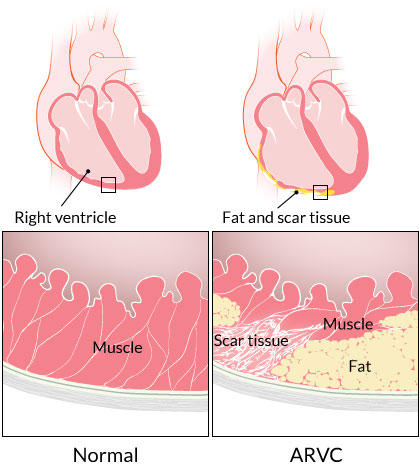Arrhythmogenic right ventricular cardiomyopathy, or ARVC is a condition where part of the heart that is usually made up of muscle fibres is replaced by fat or scar tissue. It is an inherited condition, which means that it can run in families.
As the name suggests, it usually affects the right ventricle, but may also affect the left ventricle as well.

What are the symptoms of ARVC?
People affected by ARVC may develop symptoms of heart failure because the ventricle becomes weak. This results in fatigue, shortness of breath and swelling in the legs and abdomen.
Having ARVC also predisposes an individual to arrhythmias –abnormally fast rhythms originating from the bottom chambers of the heart. These ventricular arrhythmias may cause someone to experience palpitations, feel dizzy, pass out, or even die suddenly.
How is ARVC diagnosed?
ARVC is diagnosed based on history (family history of ARVC) and investigations, like and ECG and echocardiogram. A cardiac MRI is a good test to look at the right ventricle, to see if muscle has been replaced by fat or scar tissue.
Because ARVC is usually an inherited condition, genetic testing (a blood test) can sometimes be used to screen family members of affected individuals.
How is ARVC treated?
Unfortunately, ARVC cannot be cured. The treatment is aimed at controlling the symptoms of heart failure, and treating potentially life threatening fast heart rhythms. These fast heart rhythms may either be treated with medications or an ICD.
Sometimes if the symptoms of ARVC cannot be controlled with medications and device therapies, patients may be considered for a heart transplant.
People diagnosed with ARVC should not participate in competitive sports.